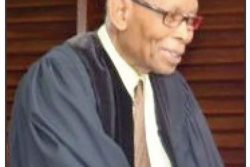x While there are plenty of earnest comments floating around about how we need to reform the Constitution, and while that intention was inscribed in the manifestos of the major political parties, nothing much has happened. The government isn’t acting on the matter, or at least is doing so at an unbelievably slothful pace, and the opposition isn’t pushing for action. It as if neither is really interested in constitutional reform and is just going through the motions.
It was Mr Ralph Ramkarran in his column last week who drew attention to the fact that there had been a recent advertisement in the press for a secretary for the Constitution Reform Commission, although the Commission itself had been appointed some months ago on April 3, 2024. This certainly does not bespeak great urgency. What it means, as he explained, is that the CRC would probably not be in a position to hold its first hearing before (or much before) the beginning of 2025, which as everyone knows is an election year. When the work of the CRC is really beginning to get underway, therefore, then so will the elections campaign, and it requires little grasp of this country’s politics to know which of the two will command most of the attention.
But Mr Ramkarran had a problem of a different kind to highlight that no one else has noticed, certainly not the opposition, which could not even bring itself to stay for the parliamentary debate on the setting up of the CRC. Under the Act of 2022 the CRC has been given an agenda, and has to take into account:
“fundamental rights; rights of indigenous people; rights of children; eliminating discrimination; improving race relations and ethnic security and equal opportunity; ensuring that the views of minorities in decision-making and in governing are given due consideration; reforms to elections and the Elections Commission and the method of electing the chair and members; protecting the economic, social and cultural rights of Guyanese; methods to maintain and strengthen the independence of the judiciary; measures to safeguard public funds and maintain and enhance integrity in public life; measures to enhance the functioning, capacity and effectiveness of the National Assembly; the functioning, capacity and effectiveness of the local government system. The Act also mandates wide consultation.”
This agenda, said the columnist, is identical to that which appears in the CRC Act of 1999, under which the work to reform the Constitution of 1980 was previously undertaken. Not only is it the same, but its functions are set out in the same sequence and in the same language. As he has noted before, Mr Ramkarran also mentioned the fact that the agenda did not include recommendations for a “national, inclusive, governance model” as had been promised in the PPP/C elections manifesto.
He reminded readers too that the constitutional amendments adopted mostly in 2001 included the establishment of various commissions, one of which (Human Rights) has never been set up at all, as well as five standing parliamentary committees. Apart from the bodies which have not been established others are not functioning as was intended. In addition many of the recommendations from the first CRC report which were unanimously adopted by the National Assembly have not been implemented.
All of this prompted Mr Ramkarran to ask: “Is the current CRC going to merely revise and/or second guess the work of the CRC of 1999? If so, is a CRC required at all? An inquiry into the adequacy of the 1999 reforms, and their efficacy, would have been more appropriate.” Since the work of the present CRC was already accomplished by that set up in 1999 he proposes that the current constitutional reform process should be aborted, or at least amended to deal with the actual issues which have concerned Guyanese since the extant Constitution came into force in 1980.
Mr Ramkarran’s recent history of constitutional developments reflects a certain reality as it relates to the attitudes of our political parties. Put simply, when they are out of office they are usually all in favour of reform, and when they accede to power their enthusiasm evaporates. For all the criticism the PPP levelled against the 1980 Constitution, when Dr Jagan became President he did not want it amended. The 1999 CRC Act came about after the protests of 1997-98 and the intervention of the ‘Three Wise Men’.
Thereafter the PNCR and its various later incarnations were insistent on further reform, pledging in the APNU+AFC manifesto of 2015 that within three months of taking office they would appoint a commission to amend the Constitution with the full participation of the people. The document ran: “The new Constitution will put the necessary checks and balances in place to consolidate our ethos of liberal democracy. Freedom of speech, reduction of the power of the President and the Bill of Rights will be enshrined in the document.”
And what did they do after they assumed office? Nothing. After finding the Constitution more to their liking when they were in power than they did before they won the election, their enthusiasm for further amendments waned. Their successor manifesto in 2020 in consequence was vaguely phrased. It undertook to “continue the work of the Constitu-tional Reform Consultative Commission, continue the allocation of funding for country-wide, community consultations and commit to contributing to a Constitution which reflects the will of the wider society, country-wide.” It is not exactly a formula for trenchant reform.
So now it is the PPP’s turn again, and its dilatoriness and slackness when drafting the CRC agenda says everything about its commitment to real reform. Apart from anything else, with some exceptions, perhaps, it is difficult to see what further amendments could be created in relation to certain rights at a constitutional level. What the Amerindians need, to give one example, is not another provision in the Constitution, but a new Amerindian Act which would pass through Parliament as an ordinary piece of legislation.
Mr Ramkarran referred to the government and others trying to “sell” the Constitution as being one of the best in the world. Certainly the AG for one likes to cite Justice Saunders of the CCJ who apparently said it was one of the most progressive in the Caribbean. That too suggests a conviction on the part of the ruling party that they do not regard any fundamental reform as being necessary.
Our Sunday columnist argued that the problem with this approach was that many Guyanese regarded the Constitution as “irretrievably tainted” because of the dishonest way in which it was imposed on the nation. There are no doubt members of the former PNC who might be uneasy with this, its veracity notwithstanding, but they have to ask themselves whether in our current circumstances this foundation document serves the purpose it should. The answer they should arrive at is that it is undeniably flawed in key respects.
Whether it should be completely scrapped, or even could be, is a different question. Mr Ramkarran might seem to favour this approach, although what little discussion there has been in the public domain might seem to lean towards radical reform. That, however, is for a later discussion. The immediate issue is the CRC, and where that is concerned he has made out a convincing case for at least amending its agenda. While ideally it should be scrapped as he says, the government will almost certainly not entertain this.
He would like to see two issues addressed in terms of the CRC’s functions, namely the powers of the President and a “national, inclusive, governance model” which the PPP/C promised in their manifesto. Others may have additional suggestions. Since the CRC clearly cannot work in competition with political campaigning next year, the government has time to reconsider the matter.
It is unlikely do so, however, unless there is widespread clamour on the matter, including from the opposition, although the present climate might not seem conducive to that. However, if the government is committed to wide consultations on the Constitution per se, in principle it should not be opposed to listening to opinions on the CRC’s terms of reference. Constitutional recommendations which do not address critical concerns because of the limitations of the CRC will just set us up for another round of disputes.









